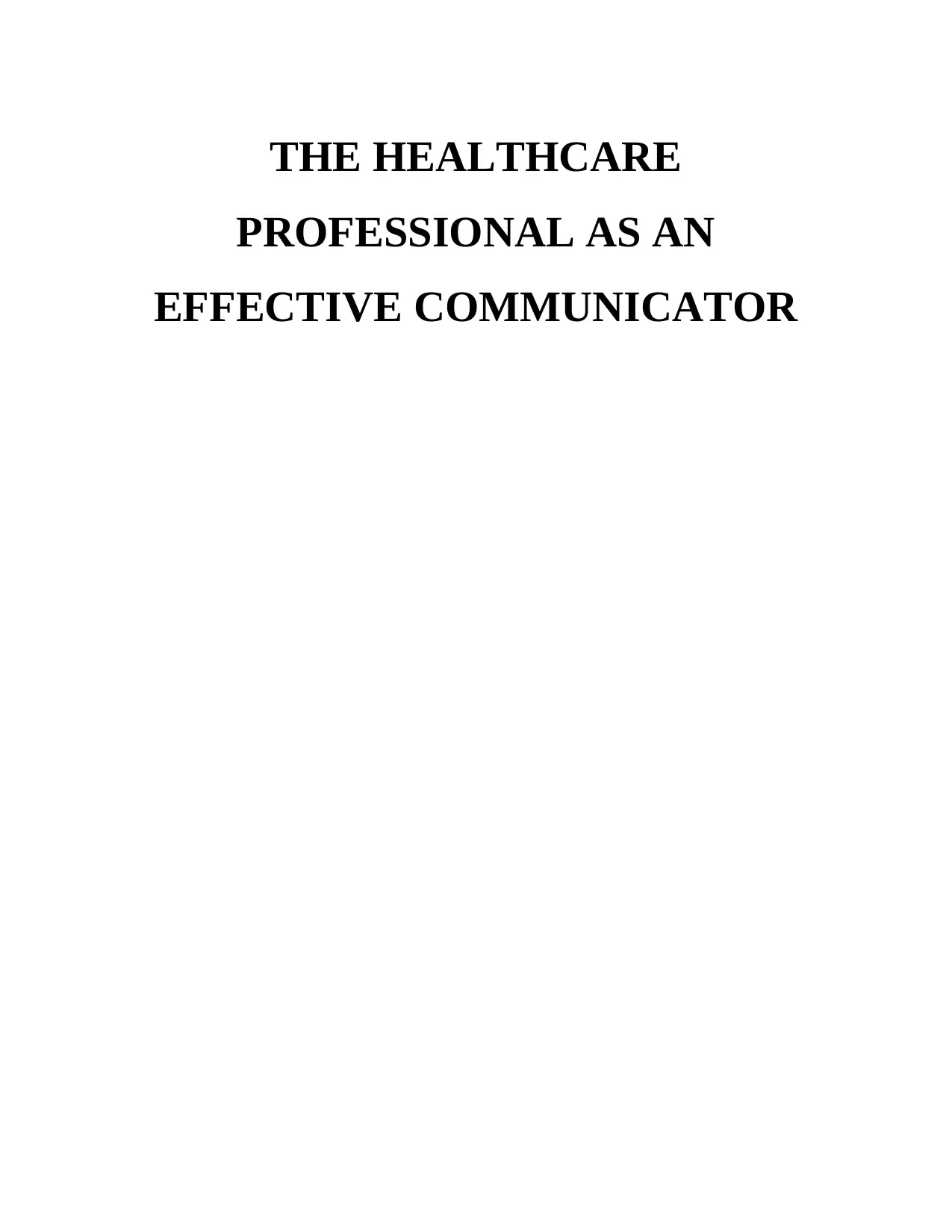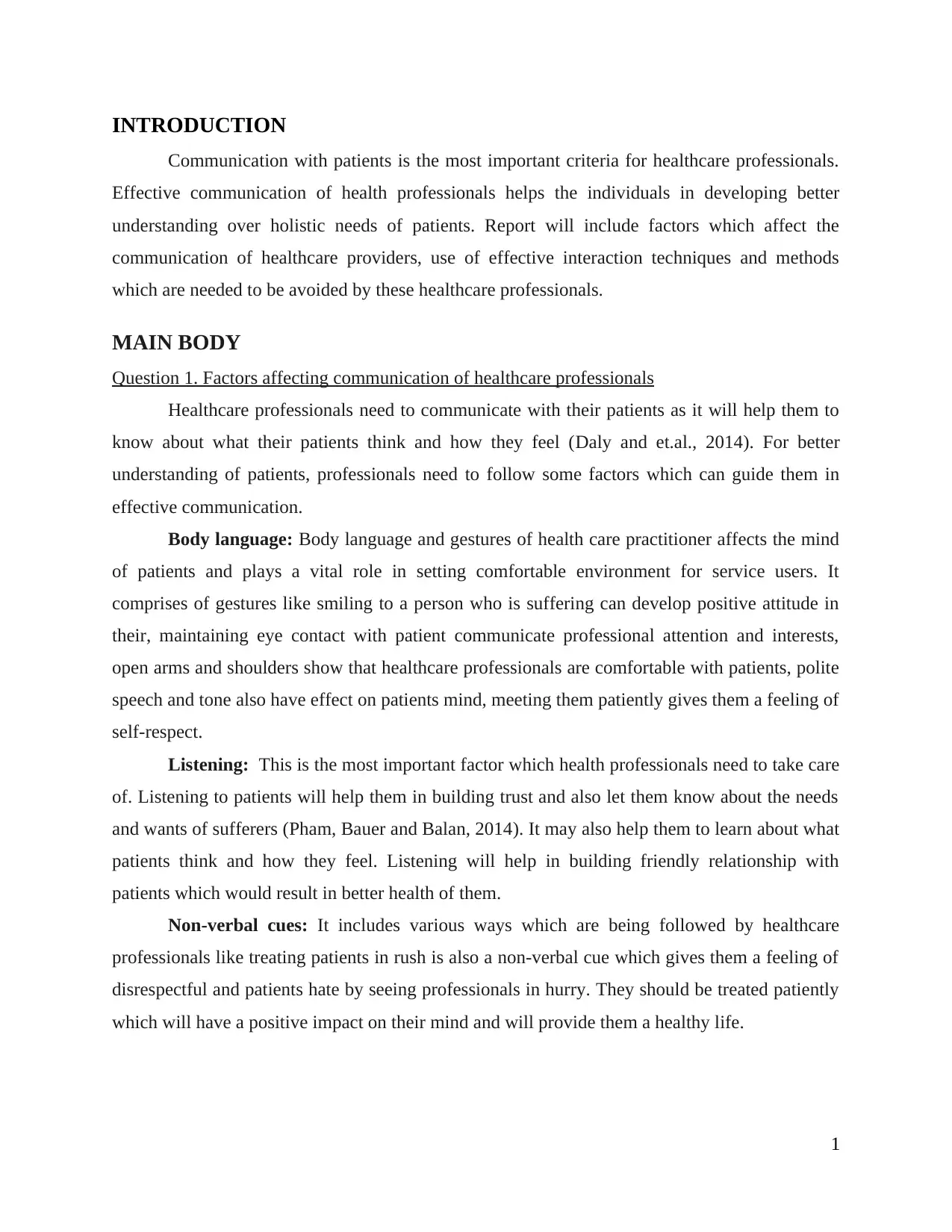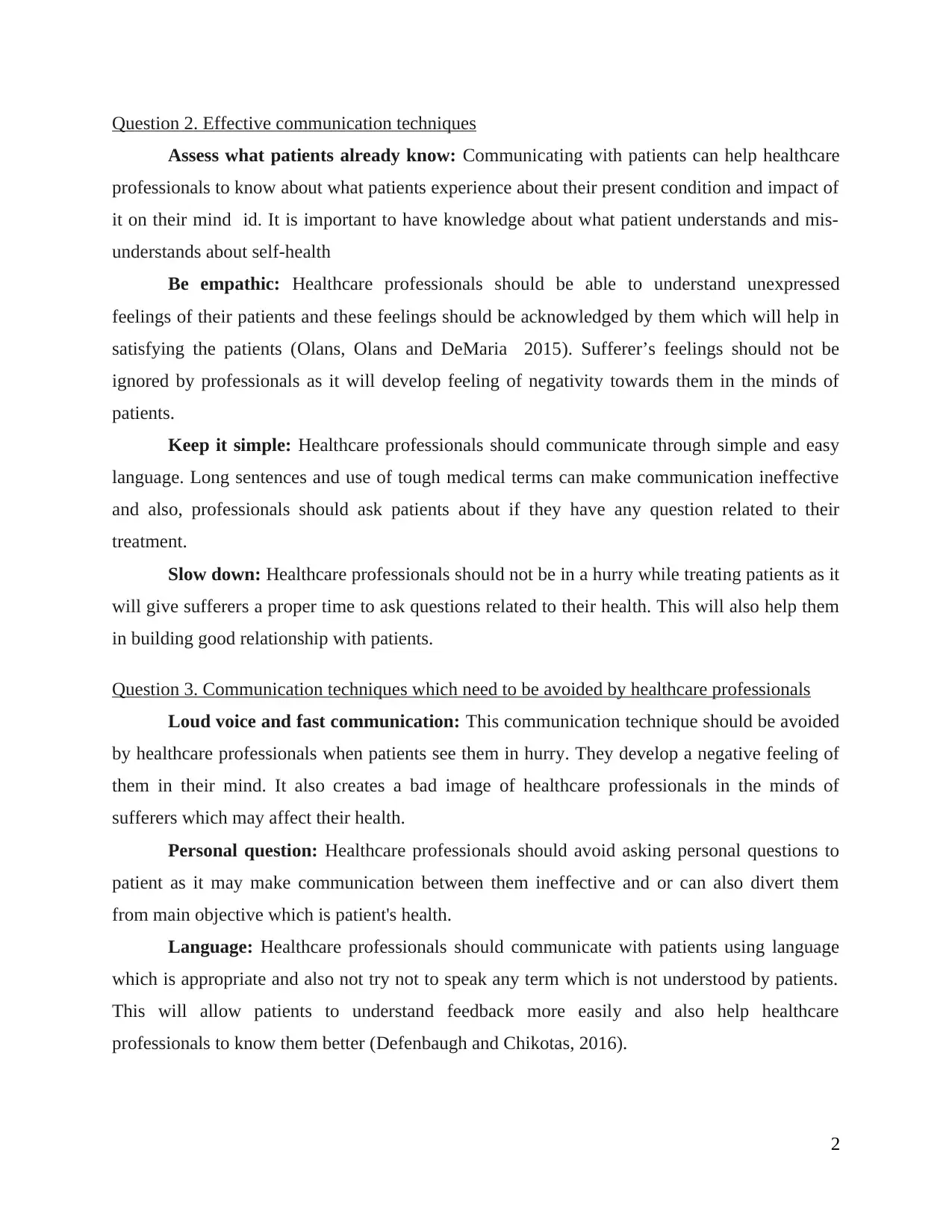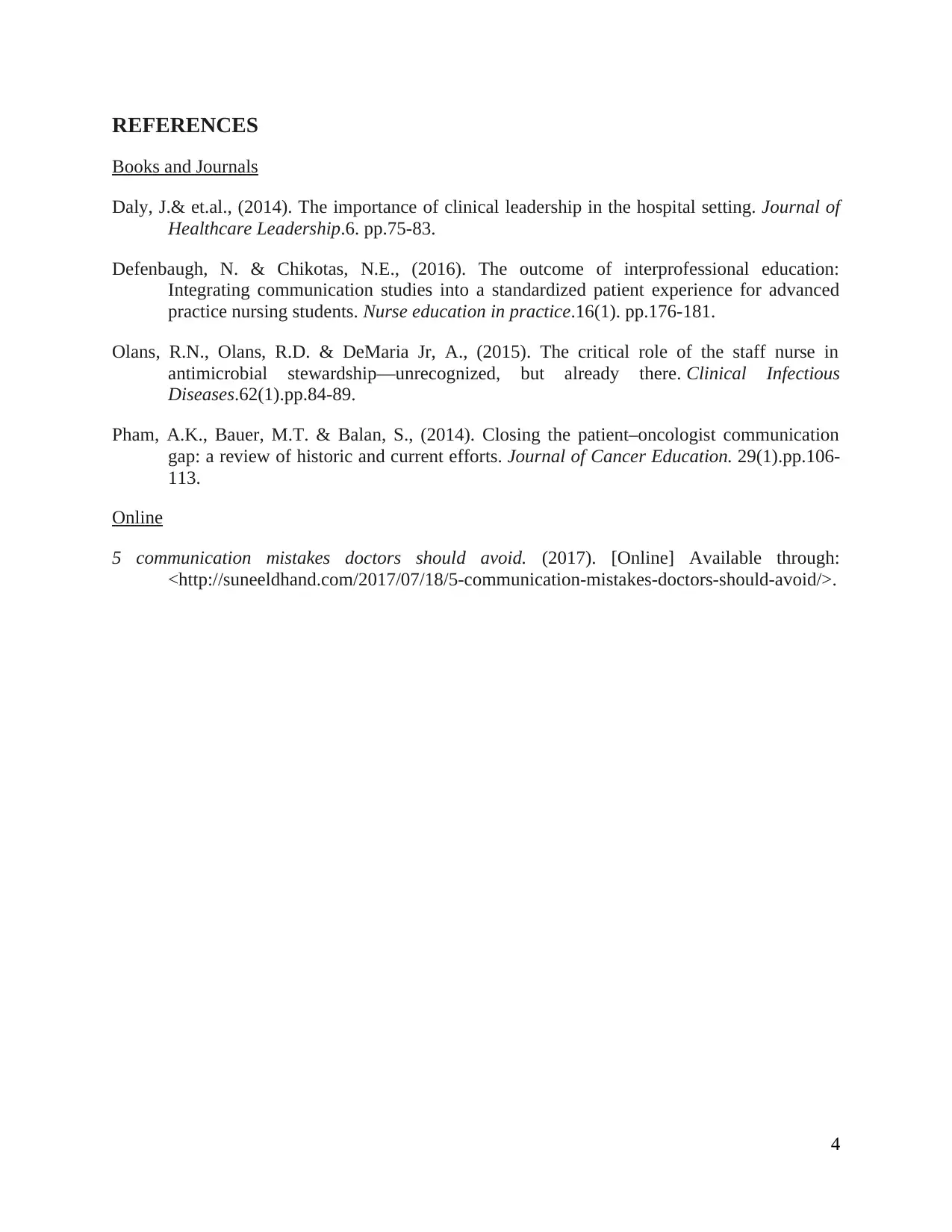The Healthcare Professional as an Effective Communicator Report
VerifiedAdded on 2020/12/26
|6
|1133
|182
Report
AI Summary
This report examines the crucial role of communication in healthcare, focusing on the perspective of healthcare professionals. It explores factors influencing effective communication, such as body language, listening skills, and non-verbal cues, emphasizing their impact on patient understanding and trust. The report outlines effective communication techniques, including assessing patient knowledge, demonstrating empathy, using simple language, and slowing down the pace of interaction. Conversely, it highlights communication techniques to avoid, such as using a loud voice, asking personal questions, using complex language, not making eye contact, and disregarding patient privacy. The report concludes by summarizing the importance of these factors and techniques in fostering positive patient-provider relationships and improving overall healthcare outcomes. The report is a valuable resource for understanding and improving communication strategies in healthcare settings.

THE HEALTHCARE
PROFESSIONAL AS AN
EFFECTIVE COMMUNICATOR
PROFESSIONAL AS AN
EFFECTIVE COMMUNICATOR
Paraphrase This Document
Need a fresh take? Get an instant paraphrase of this document with our AI Paraphraser

TABLE OF CONTENTS
INTRODUCTION...........................................................................................................................1
MAIN BODY...................................................................................................................................1
Question 1. Factors affecting communication of healthcare professionals............................1
Question 2. Effective communication techniques..................................................................2
Question 3. Communication techniques which needs to be avoided by healthcare professionals
................................................................................................................................................2
CONCLUSION................................................................................................................................3
REFERENCES................................................................................................................................4
INTRODUCTION...........................................................................................................................1
MAIN BODY...................................................................................................................................1
Question 1. Factors affecting communication of healthcare professionals............................1
Question 2. Effective communication techniques..................................................................2
Question 3. Communication techniques which needs to be avoided by healthcare professionals
................................................................................................................................................2
CONCLUSION................................................................................................................................3
REFERENCES................................................................................................................................4

INTRODUCTION
Communication with patients is the most important criteria for healthcare professionals.
Effective communication of health professionals helps the individuals in developing better
understanding over holistic needs of patients. Report will include factors which affect the
communication of healthcare providers, use of effective interaction techniques and methods
which are needed to be avoided by these healthcare professionals.
MAIN BODY
Question 1. Factors affecting communication of healthcare professionals
Healthcare professionals need to communicate with their patients as it will help them to
know about what their patients think and how they feel (Daly and et.al., 2014). For better
understanding of patients, professionals need to follow some factors which can guide them in
effective communication.
Body language: Body language and gestures of health care practitioner affects the mind
of patients and plays a vital role in setting comfortable environment for service users. It
comprises of gestures like smiling to a person who is suffering can develop positive attitude in
their, maintaining eye contact with patient communicate professional attention and interests,
open arms and shoulders show that healthcare professionals are comfortable with patients, polite
speech and tone also have effect on patients mind, meeting them patiently gives them a feeling of
self-respect.
Listening: This is the most important factor which health professionals need to take care
of. Listening to patients will help them in building trust and also let them know about the needs
and wants of sufferers (Pham, Bauer and Balan, 2014). It may also help them to learn about what
patients think and how they feel. Listening will help in building friendly relationship with
patients which would result in better health of them.
Non-verbal cues: It includes various ways which are being followed by healthcare
professionals like treating patients in rush is also a non-verbal cue which gives them a feeling of
disrespectful and patients hate by seeing professionals in hurry. They should be treated patiently
which will have a positive impact on their mind and will provide them a healthy life.
1
Communication with patients is the most important criteria for healthcare professionals.
Effective communication of health professionals helps the individuals in developing better
understanding over holistic needs of patients. Report will include factors which affect the
communication of healthcare providers, use of effective interaction techniques and methods
which are needed to be avoided by these healthcare professionals.
MAIN BODY
Question 1. Factors affecting communication of healthcare professionals
Healthcare professionals need to communicate with their patients as it will help them to
know about what their patients think and how they feel (Daly and et.al., 2014). For better
understanding of patients, professionals need to follow some factors which can guide them in
effective communication.
Body language: Body language and gestures of health care practitioner affects the mind
of patients and plays a vital role in setting comfortable environment for service users. It
comprises of gestures like smiling to a person who is suffering can develop positive attitude in
their, maintaining eye contact with patient communicate professional attention and interests,
open arms and shoulders show that healthcare professionals are comfortable with patients, polite
speech and tone also have effect on patients mind, meeting them patiently gives them a feeling of
self-respect.
Listening: This is the most important factor which health professionals need to take care
of. Listening to patients will help them in building trust and also let them know about the needs
and wants of sufferers (Pham, Bauer and Balan, 2014). It may also help them to learn about what
patients think and how they feel. Listening will help in building friendly relationship with
patients which would result in better health of them.
Non-verbal cues: It includes various ways which are being followed by healthcare
professionals like treating patients in rush is also a non-verbal cue which gives them a feeling of
disrespectful and patients hate by seeing professionals in hurry. They should be treated patiently
which will have a positive impact on their mind and will provide them a healthy life.
1
⊘ This is a preview!⊘
Do you want full access?
Subscribe today to unlock all pages.

Trusted by 1+ million students worldwide

Question 2. Effective communication techniques
Assess what patients already know: Communicating with patients can help healthcare
professionals to know about what patients experience about their present condition and impact of
it on their mind id. It is important to have knowledge about what patient understands and mis-
understands about self-health
Be empathic: Healthcare professionals should be able to understand unexpressed
feelings of their patients and these feelings should be acknowledged by them which will help in
satisfying the patients (Olans, Olans and DeMaria 2015). Sufferer’s feelings should not be
ignored by professionals as it will develop feeling of negativity towards them in the minds of
patients.
Keep it simple: Healthcare professionals should communicate through simple and easy
language. Long sentences and use of tough medical terms can make communication ineffective
and also, professionals should ask patients about if they have any question related to their
treatment.
Slow down: Healthcare professionals should not be in a hurry while treating patients as it
will give sufferers a proper time to ask questions related to their health. This will also help them
in building good relationship with patients.
Question 3. Communication techniques which need to be avoided by healthcare professionals
Loud voice and fast communication: This communication technique should be avoided
by healthcare professionals when patients see them in hurry. They develop a negative feeling of
them in their mind. It also creates a bad image of healthcare professionals in the minds of
sufferers which may affect their health.
Personal question: Healthcare professionals should avoid asking personal questions to
patient as it may make communication between them ineffective and or can also divert them
from main objective which is patient's health.
Language: Healthcare professionals should communicate with patients using language
which is appropriate and also not try not to speak any term which is not understood by patients.
This will allow patients to understand feedback more easily and also help healthcare
professionals to know them better (Defenbaugh and Chikotas, 2016).
2
Assess what patients already know: Communicating with patients can help healthcare
professionals to know about what patients experience about their present condition and impact of
it on their mind id. It is important to have knowledge about what patient understands and mis-
understands about self-health
Be empathic: Healthcare professionals should be able to understand unexpressed
feelings of their patients and these feelings should be acknowledged by them which will help in
satisfying the patients (Olans, Olans and DeMaria 2015). Sufferer’s feelings should not be
ignored by professionals as it will develop feeling of negativity towards them in the minds of
patients.
Keep it simple: Healthcare professionals should communicate through simple and easy
language. Long sentences and use of tough medical terms can make communication ineffective
and also, professionals should ask patients about if they have any question related to their
treatment.
Slow down: Healthcare professionals should not be in a hurry while treating patients as it
will give sufferers a proper time to ask questions related to their health. This will also help them
in building good relationship with patients.
Question 3. Communication techniques which need to be avoided by healthcare professionals
Loud voice and fast communication: This communication technique should be avoided
by healthcare professionals when patients see them in hurry. They develop a negative feeling of
them in their mind. It also creates a bad image of healthcare professionals in the minds of
sufferers which may affect their health.
Personal question: Healthcare professionals should avoid asking personal questions to
patient as it may make communication between them ineffective and or can also divert them
from main objective which is patient's health.
Language: Healthcare professionals should communicate with patients using language
which is appropriate and also not try not to speak any term which is not understood by patients.
This will allow patients to understand feedback more easily and also help healthcare
professionals to know them better (Defenbaugh and Chikotas, 2016).
2
Paraphrase This Document
Need a fresh take? Get an instant paraphrase of this document with our AI Paraphraser

Not making eye contact: Healthcare professionals should make eye contact with
patients, ignoring it can signify lack of trust and confidence and also give negative impact on the
minds of patients.
Privacy: Healthcare professionals should give patients their own personal space so that it
will help them in building confidence and give power to face challenges or particular situation
(5 communication mistakes doctors should avoid,2017). Also, professionals should give them
time to ask questions which are related to their health and time to express their emotions and
fears. It will also help healthcare professionals to develop a positive image in the eyes of patients
and members related to them.
CONCLUSION
Report consists of factors like body language, listening which have an impact on
communication. It also shows techniques like being empathic, slow doing etc. to have an
effective interaction with patient. Further it also includes factors like not making an eye contact,
privacy which needs to be avoided by health care professionals.
3
patients, ignoring it can signify lack of trust and confidence and also give negative impact on the
minds of patients.
Privacy: Healthcare professionals should give patients their own personal space so that it
will help them in building confidence and give power to face challenges or particular situation
(5 communication mistakes doctors should avoid,2017). Also, professionals should give them
time to ask questions which are related to their health and time to express their emotions and
fears. It will also help healthcare professionals to develop a positive image in the eyes of patients
and members related to them.
CONCLUSION
Report consists of factors like body language, listening which have an impact on
communication. It also shows techniques like being empathic, slow doing etc. to have an
effective interaction with patient. Further it also includes factors like not making an eye contact,
privacy which needs to be avoided by health care professionals.
3

REFERENCES
Books and Journals
Daly, J.& et.al., (2014). The importance of clinical leadership in the hospital setting. Journal of
Healthcare Leadership.6. pp.75-83.
Defenbaugh, N. & Chikotas, N.E., (2016). The outcome of interprofessional education:
Integrating communication studies into a standardized patient experience for advanced
practice nursing students. Nurse education in practice.16(1). pp.176-181.
Olans, R.N., Olans, R.D. & DeMaria Jr, A., (2015). The critical role of the staff nurse in
antimicrobial stewardship—unrecognized, but already there. Clinical Infectious
Diseases.62(1).pp.84-89.
Pham, A.K., Bauer, M.T. & Balan, S., (2014). Closing the patient–oncologist communication
gap: a review of historic and current efforts. Journal of Cancer Education. 29(1).pp.106-
113.
Online
5 communication mistakes doctors should avoid. (2017). [Online] Available through:
<http://suneeldhand.com/2017/07/18/5-communication-mistakes-doctors-should-avoid/>.
4
Books and Journals
Daly, J.& et.al., (2014). The importance of clinical leadership in the hospital setting. Journal of
Healthcare Leadership.6. pp.75-83.
Defenbaugh, N. & Chikotas, N.E., (2016). The outcome of interprofessional education:
Integrating communication studies into a standardized patient experience for advanced
practice nursing students. Nurse education in practice.16(1). pp.176-181.
Olans, R.N., Olans, R.D. & DeMaria Jr, A., (2015). The critical role of the staff nurse in
antimicrobial stewardship—unrecognized, but already there. Clinical Infectious
Diseases.62(1).pp.84-89.
Pham, A.K., Bauer, M.T. & Balan, S., (2014). Closing the patient–oncologist communication
gap: a review of historic and current efforts. Journal of Cancer Education. 29(1).pp.106-
113.
Online
5 communication mistakes doctors should avoid. (2017). [Online] Available through:
<http://suneeldhand.com/2017/07/18/5-communication-mistakes-doctors-should-avoid/>.
4
⊘ This is a preview!⊘
Do you want full access?
Subscribe today to unlock all pages.

Trusted by 1+ million students worldwide
1 out of 6
Related Documents
Your All-in-One AI-Powered Toolkit for Academic Success.
+13062052269
info@desklib.com
Available 24*7 on WhatsApp / Email
![[object Object]](/_next/static/media/star-bottom.7253800d.svg)
Unlock your academic potential
Copyright © 2020–2026 A2Z Services. All Rights Reserved. Developed and managed by ZUCOL.





